A young man or womanís decision to join the
military is often important because it is his or her first independent
decision. This decision may chart their career or at least the course of
their life for several years. My decision to join the Army during the height
of the Vietnam War was just that for me. Even though my family and many
friends had doubts about my joining the Army I was clear about my decision,
but no one can foresee all that the future holds.
| Many generations of the Loomis family served our
country since a Loomis served as a quartermaster officer to George
Washingtonís Army. Growing up I was told stories of family members serving
with distinction including my father who told of his winter in Italy during
WWII as a bomber pilot and the Distinguished Flying Cross he was awarded. It
was a high example set for me to serve my country. |
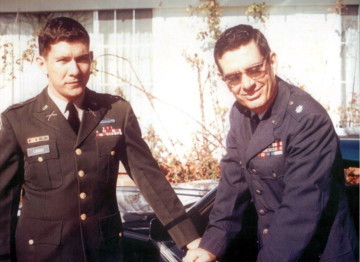
Steve
Loomis with his father, a USAFR Lt Col veteran of WWII and Korea. |
At the time I enlisted in the Army in Albuquerque
in 1967, I was only beginning to understand that I might be somewhat
different, but did not yet realize that I was gay. Even as I worked through
training and took my first assignment as a clerk at Fort Benning, Georgia,
it was not apparent to me and certainly not to others. What was apparent,
was that I enjoyed the physical and mental challenge of military life, the
structured teamwork with others, and soon was accepted for Infantry Officer
Candidate School at Fort Benning.
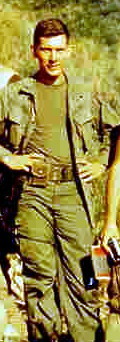 |
After more months of grueling training my father
proudly pinned my gold bars on my uniform at graduation. Within six months I
was with the 4th Infantry Division in the Central Highlands of Vietnam. My
second day in command of my platoon in 3d Battalion 12th Infantry Regiment
near the Cambodian border was one of the longest in my life. The company
commander was wounded and four others killed in an NVA ambush and I briefly
found myself in command of our isolated jungle mountain firebase. I believe
that the decisions that I made with my NCOs in the coming days and months
made 1st Platoon the one that commanders knew they could depend on. "First
in and last out" was the motto we adopted for ourselves. We
patrolled in the remote Ia Drang Valley, Pleiku, through the rugged Chu Pa
Mountains and across the booby trap infested coastal area. 1st Platoon was
the most decorated in the company that year and I returned home with two
Bronze Stars and a Purple Heart. Most importantly I only lost one man that
year which is something I have never forgotten. I have honored his memory
many times by pausing in prayer by his name on the wall at the Vietnam
Memorial in Washington. |
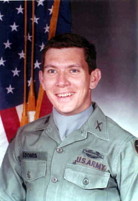 |
Back in the States by 1970, I could have returned
to civilian life, but extended my service, serving as a Company Commander
twice, battalion staff and executive officer in the Army Reserves and then
back on active duty. By now I realized I was gay, but carefully kept my
private feelings separate from my military life. Numerous friends and
associates, my group commander and even a general officer either knew or
thought I might be gay. Yet, it never affected my work. My one regret was
that my military service discouraged me from entering a long term
relationship. I could not take a "friend" or "partnerí to a
dining in or even introduce them to the "brothers" in the unit. |
Promoted to Lieutenant Colonel in 1986, I served as
Chief of Military Education for the entire Army Reserves, developing an
airline reservation like system that saved millions of dollars for officer
and enlisted training. Then as a division inspector general, I developed and
conducted one of the first unit climate surveys that clearly showed, among
other issues, there was more tolerance for gays in the military than anyone
at that time had reason to believe and that women were adversely affected by
the prohibition of gays in the military. My commanding General accepted the
report without question. In 1993 "Donít Ask, Donít Tell"
was passed as a compromise between President Clinton and Congress. Although
still objectionable, I thought the change might be somewhat better than the
previous complete prohibition. It was then, after meeting with Randy Shilts
in my home, I made a decision that if my homosexuality was ever discovered;
I would fight to stay in the Army. Randy intended to use our conversations
in his follow-up to his seminal book, Conduct Unbecoming, but died of
AIDS before it was completed. It wouldnít be long before my resolve would
be put to the test.
Finally, I was assigned as the Chief of Engineer
War Plans for III Corps at Fort Hood, Texas. In a continuous high operations
tempo, we trained repeatedly to deploy the Corps, the 1st Cavalry Division
and the 4th Infantry Division to the Middle East and after the death of Kim
Il Song in 1994, we trained intensely for the defense of South Korea. We
spent repeated extended periods of duty in South Korea evaluating the
terrain, enemy and writing our plans.
Just weeks after being selected for promotion to
Colonel and on the night I was awarded a fourth Meritorious Service Medal, I
came home to find my house on fire from arson. After saving my Labrador,
Brig, but losing my Manx cat, Nevada, I quickly realized it was set by a
former partner who later said he acted from fear of what the Army might do
under "Donít Ask, Donít Tell" if they found out he was
gay. It shook me with equal parts of anger and fear. Those following hot
August days were made more bearable as friends, neighbors and associates,
gay and straight, helped me clean out my house and recover my property while
I tensely waited for the Army to act on illegally gained information that I
was gay. From the night of the fire, I knew without hesitation I would fight
the Armyís effort to discharge me, no matter how difficult or isolating it
might become.
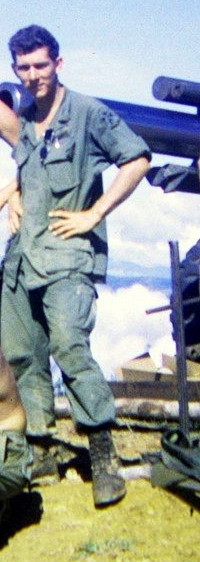
1LT Loomis
with
1st Platoon NCOs on firebase in Central Highlands, Vietnam 1970 |
In the coming months I, my military and civilian
attorneys with assistance from Servicemembersí Legal Defense Network,
discovered errors and fabrications in the Armyís claims, but the Army had
made up its collective mind. A day did not pass that family or friends did
not call to check on me or to offer support. The Army was unwilling to admit
mistakes were made and discharged me in the summer of 1997 just five days
before I was eligible for full 20 year retirement. Even though the Army
acknowledged they claimed "force, coercion or intimidation"
without factual grounds, they refused to reinstate my retirement
eligibility. It was, and remains, a tactic often used by the military in
cases against gays. To fight this injustice I made a difficult decision to
open my private life to the media and within days of my discharge my story
ran on the front page of the Dallas Morning News and then across the
national press. When Morley Safer of CBS interviewed me on 60 Minutes, we
knew we had a strong public case and that the public was becoming more
interested in the problems caused by Donít Ask, Donít Tell.
Finally, we filed our case in the U.S. Federal
Court of Claims and were the first case to argue the unconstitutionality of
"Donít Ask, Donít Tell" following the Lawrence v.
Texas Supreme Court decision. Our judge was conservative but, we felt
that if he adhered to the law as most conservatives claim they must, we
would win our case. We also understood that he would find for us on narrow
grounds, so he could avoid setting precedent. After hearing the arguments,
and attempting unsuccessfully to get a settlement agreement from the Army,
he ordered the Army to retire me with full back pay. In an unusual act, the
judge also ordered the Army to pay attorneys fees to me as the prevailing
party. Winning and getting my retirement back would have been a tremendous
relief, but the Donít Ask, Donít Tell policy remained and
thousands of other Americans still served under its all to draconian and
debilitating shadows. |
Not long after, Sergeant Wilcox who served in my 1st
Platoon in Vietnam called me from his home in Utah. He, his wife and other
buddies had seen the 60 Minutes story and hoped I won my case. For my guys
from combat to track me down and offer their support was a fitting end.
Finally, nine years after my discharge, I could move on and fight Donít
Ask, Donít Tell from outside the Army.
In the dust and mud of Vietnam soldiers huddled
against each other as rounds sailed toward their positions. No one asked if
the guy beside them was gay, only if he had his steel pot on, rifle ready
and his mind clear. We must judge every soldier, straight or gay, not by
what they do consensually in their private bedroom, but by how well they do
their job and if they succeed in their mission. Increased diversity in the
military has sometimes meant pain in the short run, but it has always in the
long run brought increased strength and respect for our military not only
within our country, but around the world. When equal rights to serve are
extended to gays, they will continue to serve as well and as faithfully as
all others. Few but themselves will notice any difference and all the
military will be better for it.
*******************
Lieutenant Colonel
Loomis is now retired in Albuquerque, New Mexico. He is the President of the
Bataan Chapter of American Veterans for Equal Rights. As a teenager he
became an Eagle Scout. He is a graduate of the University of New Mexico with
a Bachelorís in Journalism. During his military career he served in the
Infantry and Engineer branches and was awarded:
|
Combat Infantry Badge
Bronze Star for Valor
Bronze Star for Service
Purple Heart
Meritorious Service Medal - 4th award
Air Medal
Army Commendation Medal Ė 2d award
Army Achievement Medal Ė 2d award
Good Conduct Medal
Army Reserve Components Achievement Medal
National Defense Service Medal w/1st Star
Vietnam Service Medal
Armed Forces Reserve Medal
Army Service Ribbon
Vietnam Campaign Ribbon
|
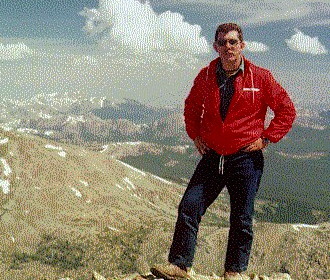
Mt.
Elbert, highest peak in Colordao, 1974
|
©
2008 Gay Military Signal